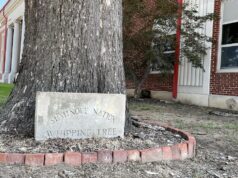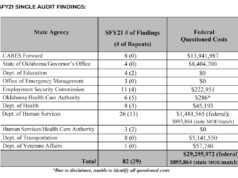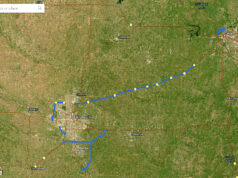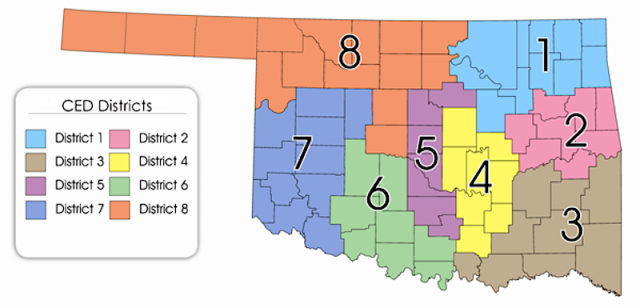

Circuit Engineering District 7 officials voted at their regular monthly meeting Tuesday to hire an attorney following the release of an audit by the state of Oklahoma that found several irregularities.
Circuit engineering districts exist to coordinate various activities between neighboring counties. The state audit looked at both CED 7, in southwest Oklahoma, and the CED 7 County Energy District Authority, an entity that deals with certain financial matters and is run by the statewide CED board of directors, which met earlier today.
According to the audit (embedded below), CED 7 and the CED 7 County Energy District Authority “entered in to a joint-venture agreement, with the primary purpose ‘to engage in the business of manufacturing and marketing of a proprietary formula road repair and maintenance product.’ ” To this end, the two entities opened an asphalt emulsion plant.
A large part of the examination from State Auditor and Inspector Cindy Byrd’s office focused on the industrial venture, saying CED 7 and the CED Authority were not statutorily authorized to open an asphalt emulsion plant, that they did not abide various financial agreements regarding a $2.3 million loan secured to fund the project, and that the venture, known as 7 Oil, was not properly reviewed by the board.
The audit also found that CED 7 released requests for bids on an emulsion product that was proprietary to the 7 Oil venture, precluding other vendors from entering into bidding.
“Although not prohibited, it was also noted that 7 Oil products were bid at higher amounts in the member counties,” the audit stated. “This appears to undermine the objective of the joint venture, which was to reduce costs for CED 7 member counties.”
However, the audit also notes that, while the 7 Oil emulsion product was treated as exclusive to the company for the purposes of bidding, “Per an Oklahoma Department of Transportation (ODOT) analysis, the 7 Oil emulsion was not a ‘proprietary or exclusive formula’ and did not constitute a sole source product, or one to be narrowly bid.”
Oklahoma Association of General Contractors executive director Bobby Stem said the 7 Oil formula was not particularly desirable or widely used, something he believes the bank that lent the money to construct the emulsion plant did not know.
“I believe the lender took the risk based on the fact the investors in the trust to create the plant were a government agency,” he said. “Had they realized the formula that had been purchased by CED 7 had been ignored by the private sector for a while, the loan might not have happened.”

Payments to family members scrutinized
Additionally, the audit found that between 2010 and 2013 nearly $17,000 in payments were made to the son and wife of CED 7’s then-executive director Monte Goucher.
Goucher’s son received more than $13,000 for things like per diems, trailer usage and labor. His wife received nearly $3,750 for rental of a fifth-wheel trailer.
Approval for those payments are not found in CED 7 meeting minutes, the audit found.
Oklahoma statute Title 21 Section 481(A) prohibits executive officers from appointing family members to positions or duties in the officers’ government entity when the pay or compensation for the positions or duties is to be paid out of the public funds of the government entity.
Promising ‘PR consequences,’ Goucher resisted audit
Goucher initially was found to be uncooperative with Byrd’s audit, which was requested by four district attorneys in western Oklahoma. According to the audit, Goucher refused to provide requested documents until after the board had been presented a records request.
In a subsequent phone conversation, Goucher told auditors “the need for some of the requested records was questionable and that he thought that three of the four district attorneys requesting the audit just ‘went along with the request'” of the state auditor. The records were still not provided at that time, the audit said.
Goucher also told two of the district attorneys involved that they requested the audit because they “wanted media attention” and were on a “political witch hunt,” the report states.
Additionally, the report said Goucher “blew up” and told one district attorney there would be “PR consequences” if the audit proceeded. Goucher was told by one DA that he was getting close to obstructing justice, the report said.
Goucher also asked two state representatives to intervene in the audit process, according to the audit.
Goucher resigned his post in Sept. 2018.
CED 7 president says ‘proper processes’ used
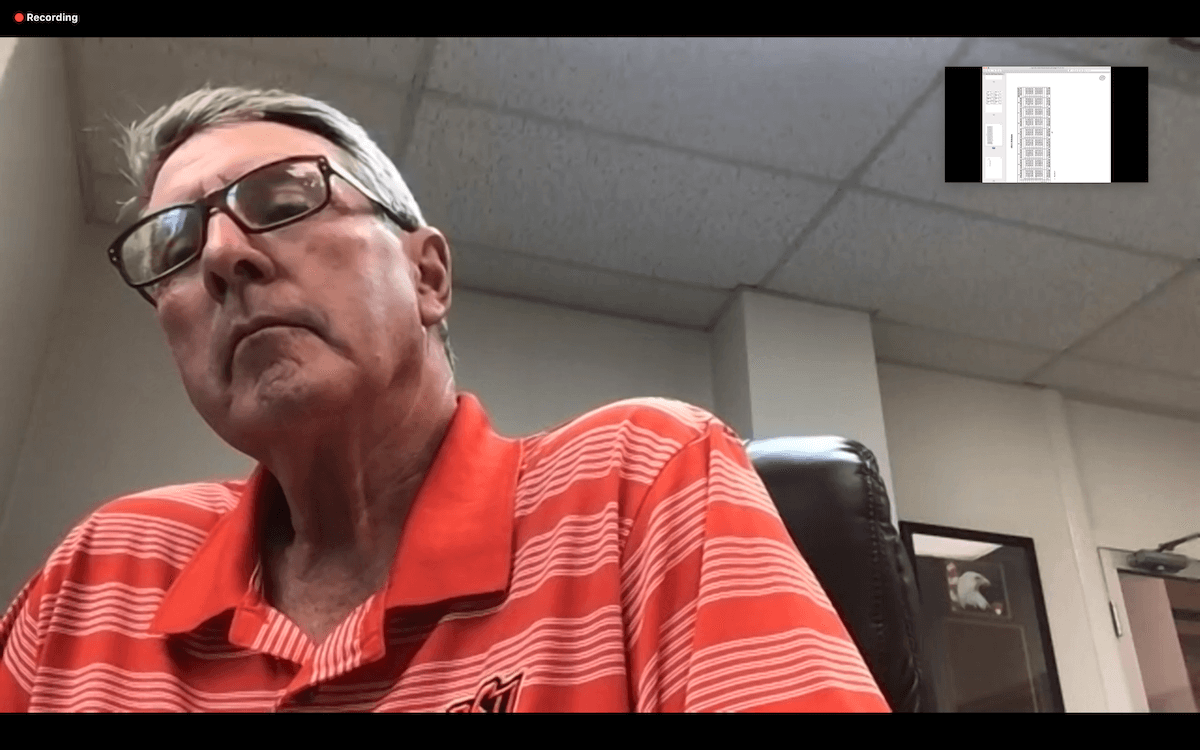
CED 7 president Joe Don Dickey, a longtime Tillman County commissioner, said in a statement to NonDoc he believes his organization acted within the boundaries of state law (sic):
On behalf of our CED 7 board members I would like to discuss the reasons for building the emulsion plant. One of the core services counties perform is road maintenance. The primary material we use is road oil. Approximately 12 years ago the major supplier of road oil in the state filed for bankruptcy and the product was difficult if not impossible to obtain. We could not adequately maintain our roads. The counties in southwest Oklahoma guided by our legal counsel formed a trust authority, enabled by statute, which could provide this material. This gave the counties control over the quality and availability of this product. Also by statute, CED 7 has an independent yearly audit conducted, which is submitted to the State Auditors’ office, and is posted on their website. The CED 7 board through our legal counsel and by direction of our executive director guided us through the proper processes and procedures known to them. We are here to do a public service the best we can.
What is the purpose of a CED?
The state’s eight Circuit Engineering Districts are aimed at increasing efficiency by coordinating activities between counties in each district. That can include counties seeking bids for construction projects like roads and bridges together, in order to save money, or purchasing expensive pieces of equipment and sharing their usage.
The state currently has eight circuit engineering districts, each encompassing multiple counties.
CED 7 covers Beckham, Blaine, Custer, Dewey, Greer, Harmon, Jackson, Kiowa, Roger Mills, Tillman and Washita counties.
Stem said the concept is ripe for reform.
“Anything that keeps tax dollars from getting to our county roads and bridges is a nuisance,” he said. “CEDs have become a state-sanctioned nuisance. They are another layer of government that is actually competing with the private sector. I believe the growth of CEDs over the last 10 years has cost Oklahomans much needed county road and bridge repairs.”
The statewide Oklahoma Cooperative Circuit Engineering District Board met by Zoom videoconference at 11 a.m. this morning. Board members passed all items on their agenda.
CED 7 audit
